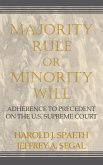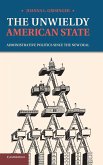Nathan Brown's penetrating account of the development and operation of the courts in the Arab world is based on fieldwork in Egypt and the Gulf. The book addresses several important questions. Why, for example, did Egypt's political leaders construct an independent judicial system that limited their own authority? And why does such a system appeal to Arab rulers outside Egypt? While most accounts stress the role of imperialism or liberal ideology, the author maintains that the primary purpose of the system is to provide support for the officially sanctioned order. The model offers similar attractions for other Arab rulers. From the theoretical perspective, the book will contribute to the debates about liberal legality, political change and the relationship between law and society in the developing world. It will be read by scholars of the Middle East, law students and those interested in the history of law and its evolution.
Table of contents:
1. Arab courts in comparative perspective; 2. The creation and operation of the modern Egyptian legal system, 1876-1937; 3. Egyptian courts 1937-1971: centralization, authoritarianism, and socialism; 4. Egyptian courts 1971-1996: the re-emergence of liberal legality; 5. Legal reform in the Arab states of the Gulf; 6. The legal system and the rule of law in Kuwait and Qatar; 7. Popular uses of the courts; 8. Business and the courts; Conclusion.
The book addresses important questions about the nature of Egypt's judicial system and the reasons why such a system appeals to Arab rulers outside Egypt. From the theoretical perspective, it also contributes to the debates about liberal legality, political change and the relationship between law and society in the developing world.
A penetrating account of the development and operation of the courts in the Arab world, based on fieldwork in Egypt and the Gulf.
Hinweis: Dieser Artikel kann nur an eine deutsche Lieferadresse ausgeliefert werden.
Table of contents:
1. Arab courts in comparative perspective; 2. The creation and operation of the modern Egyptian legal system, 1876-1937; 3. Egyptian courts 1937-1971: centralization, authoritarianism, and socialism; 4. Egyptian courts 1971-1996: the re-emergence of liberal legality; 5. Legal reform in the Arab states of the Gulf; 6. The legal system and the rule of law in Kuwait and Qatar; 7. Popular uses of the courts; 8. Business and the courts; Conclusion.
The book addresses important questions about the nature of Egypt's judicial system and the reasons why such a system appeals to Arab rulers outside Egypt. From the theoretical perspective, it also contributes to the debates about liberal legality, political change and the relationship between law and society in the developing world.
A penetrating account of the development and operation of the courts in the Arab world, based on fieldwork in Egypt and the Gulf.
Hinweis: Dieser Artikel kann nur an eine deutsche Lieferadresse ausgeliefert werden.








